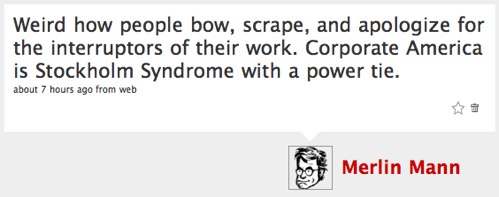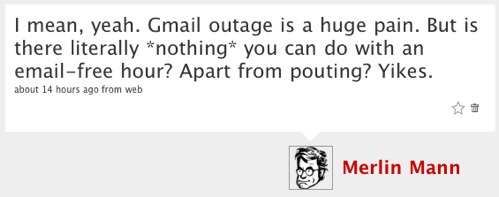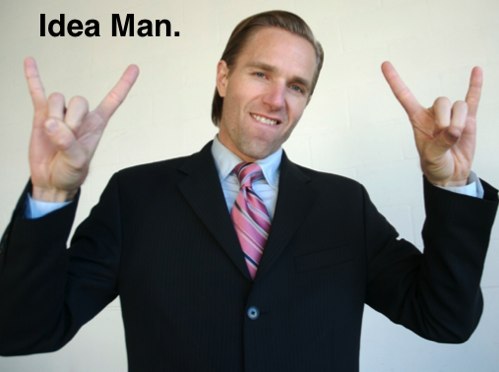Merlin’s weekly podcast with Dan Benjamin. We talk about creativity, independence, and making things you love.
August, 2008Deciding Whether to Read a Book: Some Wildly Reductive HeuristicsMerlin Mann | Aug 27 2008
On the off chance that you care or find it useful in developing your own filtering, here's my insanely reductive, mean-busy-guy way to make a 90-second decision on whether to read a new non-fiction book from an author I'm not familiar with. It does not matter whether you agree with these; that's how you know they're personal heuristics. Also, they are almost uniformly unfair and unkind. So. read more »POSTED IN:
Ubiquity: Firefox Gets its Quicksilver OnMerlin Mann | Aug 27 2008Aza’s Thoughts » Ubiquity In Depth Take a few minutes this week to look at the Ubiquity plugin for Firefox. So far, I've spent just enough time with it to have my mind blown by the Quicksilver-like interface it wants to bring to web browsing. read more »POSTED IN:
Social Networks: The Case for a "Pause" ButtonMerlin Mann | Aug 26 2008
As duplicitous and sad as "fake following" sounds -- and let's be honest: the whole idea's pathetic on a number of levels -- for a certain kind of user, I can see why there's a desire for this functionality. Especially on a site like FriendFeed, which has quickly become the platform of choice for the web's least interesting narcissists -- and the slow-witted woodland creatures who enjoy grooming their fur -- this is a major breakthrough in the makebelieve friendship space. Yes, primate culture may be primitive, but it is not without its evolving needs. Thing is, "fake following" is also not so far off from a more wholesome feature that I've been begging for on social networks for years now: Any application that lets you "friend," "follow," or otherwise observe another user should include a prominent (and silent) "PAUSE" button. read more »POSTED IN:
The Problem with Ubiquitous CaptureMatt Wood | Aug 22 2008
Late in the week, an entire day was devoted to a presentation by a FrankinCovey trainer who showed us how to use the fancy leather-bound, three-ring binder/planner/organizer that our company purchased for us, complete with a storage case for archiving calendar pages. She ran us through the whole Covey system. We watched a video of one of Stephen Covey’s motivational seminars-cum-religious revivals and made lists of our goals, hopes, and regrets. I raised my hand and told a story about how lousy I felt for saying something nasty to my mom before I left that week. “Call Mom to apologize” went onto my Weekly Compass, marked Priority A. At one point, the trainer demonstrated a little pocket notebook that could be detached from the binder when you didn’t want to lug around the whole thing, “a satellite that always returns to the mothership,” she called it. We snickered while she pantomimed writing down someone’s phone number at a Bears game; she was crazier than the guy in suspenders from the day before who taught us about management with a modified version of Monopoly. Most of us were planning to buy Palm Pilots with our first paychecks anyway. But I didn’t realize then how prescient that moment was. Training class Matt would laugh Matt circa 2008 all the way down I-90 if he could see me now. read more »POSTED IN:
Quote of the Week: On MultitaskingMerlin Mann | Aug 22 2008My quote of the week comes from a comment by Eideteker in this Metafilter thread on multitasking:
And, for what it's worth, here's what I had to say about the myth of multitasking a few years back: read more »POSTED IN:
Admin: Why a Footer in 43 Folders Feed Items?Merlin Mann | Aug 21 2008Why a Footer in 43 Folders Feed Items? We've added a footer to items that appear in the 43 Folders RSS feed. Here's why. read more »POSTED IN:
Attention & Ambiguity: The Non-Paradox of Creative WorkMerlin Mann | Aug 20 2008Psychology Today: The Creative Personality [via delicious.com/huxant, w/a reminder by Jack Shedd] Some days, I can't decide how I feel about Mihaly Csikszentmihalyi (say: " So, although I'm trying not to audibly roll my eyes at a pop-psychology Top 10 list about creativity's "dialectical tension," I definitely am interested in one of his observations about the "paradox" of creative people. read more » POSTED IN:
What Makes for a Good Blog?Merlin Mann | Aug 19 2008My friends at Six Apart recently asked me to make a list of blogs that I enjoy. I think they're planning to use it for their new Blogs.com project. Unfortunately, I'm late getting it to them (typical), but if it's still useful, I'll post it here in a day or four. As I think about the blogs I've returned to over the years -- and the increasingly few new ones that really grab my attention -- I want to start with, ironically enough, a list. Here's what I think helps make for a good blog. read more »POSTED IN:
Closed Doors and Casualties in the "Coup d'attention"Merlin Mann | Aug 16 2008Last night, I got home from a lovely one-day trip to do some speaking, and I was catching up on a couple emails before I went to bed. One of the messages was a thoughtful note from someone who works in the US Government (and whose name, job, and identifying elements I'm changing to protect his or her privacy). "Sally," I'll call her, likes the 43 Folders stuff, but has legitimate concerns about how all this "attention management" stuff might send a wrong or hostile message to her colleagues. It's a great point. read more »POSTED IN:
Cooking for the Creative BeastMatt Wood | Aug 15 2008Guest postGuest blogger, Matt Wood, learns how to feed his creative side (without giving it a big gut). —mdm Earlier this summer, I was in the kitchen, trying to cook dinner. I had a pot on the stove and a fire going on the grill outside. I was fumbling with a bag of frozen peas when my three-year-old started shouting at me to fix one of his toys. “Hold on a second, son,” I said. “I can’t do two things at once.” He looked me, dead serious, and said, “But you have two hands, Daddy.” Too Many Pots on the Stove
My immediate solution has been to limit the inputs and not try to do so much at once. If I can’t cook a nice meal with a preschooler underfoot, then I won’t even try. Chicken nuggets and grilled cheese for everyone, and you’ll like it, thank you very much. While this approach to dinner fulfills various statutes regarding child neglect, it’s also not very satisfying. Apply this approach to work and it certainly creates more time to do Important Things, but it makes for soggy, microwaved output as well. read more »POSTED IN:
Time & Attention Presentation: "Who Moved My Brain?"Merlin Mann | Aug 14 2008Who Moved My Brain? Revaluing Time & Attention (slideshare.net)
As I've been going over my slides for the Time & Attention talk, I realized I hadn't shared how the material has evolved since it premiered at Macworld in January. Which is to say, "Kind of a lot." So, I've posted the updated deck. read more »POSTED IN:
Task Times, The Planning Fallacy, and a Magical 20%Merlin Mann | Aug 13 2008Overcoming Bias: Planning Fallacy Via The Guardian, via Chairman Gruber, comes this post from the new-to-me blog, Overcoming Bias. It discusses the research behind a common cognitive bias known as The Planning Fallacy, which is a repeatable, documented error in thinking that apparently explains why we all tend to "underestimate task-completion times." It's summed up nicely by Gödel, Escher, Bach author Douglas Hofstadter's Law regarding the time it takes to do anything:
Sounds familiar. From the Overcoming Bias post:
Cf: The Optimism Bias. read more »POSTED IN:
Gmail Outage or: How I Learned to Stop Worrying and Love GTD ContextsMerlin Mann | Aug 12 2008Like thousands of people yesterday, I was annoyed and inconvenienced by Gmail's unexpected 2-hour dirtnap. But, wow. Apparently, it just irrevocably hijacked the whole day for some folks. And even sent a few into a Dark Afternoon of the Soul that most 19th-century Romantic poets would have found a bit histrionic. Now, as a user, polemicist, and nemesis of Apple's MobileMe problems, I'm not here to criticize the frustration about a broken cloud service; I know that feeling all too well and have the dents in my wall to prove it. But, I do want to talk about some strategies you can choose to employ whenever a change in access to anything unexpectedly rearranges your day. Because things do break, and there's no reason you have to break with them. read more »POSTED IN:
Ideas, Execution, and the Rare AuteurMerlin Mann | Aug 11 2008ideas are just a multiplier of execution - O'Reilly ONLamp Blog Derek Sivers' short blog post from 2005 has been making the rounds lately -- it came to me via Chairman Gruber -- and I have to say, I can't stop thinking about it. I think this is really profound thinking around the fundamental misunderstanding many people have about the value of ideas. In a nutshell, Derek says ideas are valuable only inasmuch as they can be multiplied by execution. So, if you remember your 3rd grade arithmetic, you can figure out the product of even the most fantastic idea when it's multiplied by zero execution. I, too, frequently encounter this attitude of "Sign the NDA! Sign the NDA!" any time someone wants to tell me about their squirrelly idea for making a bajillion dollars on the internet, and I almost always end up saying the same six things to The Idea Men: read more »POSTED IN:
Berkun's Game-Changer: Disruptive, Breakthrough Essay on Transformative Jargon Utilization.Merlin Mann | Aug 11 2008Why Jargon Feeds on Lazy Minds - Scott Berkun
Marry me, Scott. (And, yes: I, for one, will stop saying "game-changer" now. Tic noted.) Orwell's excellent 1946 essay is freely available in numerous locations and in various formats across the web. I like this vanilla version. [via delicious/charliepark] read more »POSTED IN:
Admin: IE Problem is SiteMeter-relatedMerlin Mann | Aug 10 2008Hey, way off-topic favor to ask. If you're getting errors when viewing 43 Folders in Internet Explorer, could you do me a favor? read more »POSTED IN:
Foo for Bar: Kicking Ass with Outcome-Based ThinkingMerlin Mann | Aug 8 2008The other day, I was talking with someone who is trying to encourage a Getting Things Done-like work approach amongst the people on his team. We started talking about which parts of David Allen's GTD system appear to have the greatest long-term impact on the people who have adopted it and who ultimately stick with it for years. When asked to distill everything down to its most powerful concepts, I came up with three, and here's how I'd summarize each:
While I think stuff like ubiquitous capture, the Natural Planning Model, the Two-Minute Rule, and many other bits are arguably as important, these are the three things that I feel have the biggest impact on how people's results change over time. read more »POSTED IN:
Making Time to Make: One Clear LineMerlin Mann | Aug 6 2008
This article is Part 3 of a 3-part series about attention management for people who do creative work called, Making Time to Make.
The point, from my perspective, is that Stephenson possesses the man-sized pant stones to declare precisely what the people who enjoy his work should expect from him. And, in so doing, he has drawn a clear line that some might find hard to love, but that is very easy to see, understand, and respect. No, he didn’t hire someone to answer his email, or get a kid to pretend to be him on Twitter, or install a Greasemonkey script that “autopokes” people on Facebook (I’ll leave you to guess which two of these I do). Neal Stephenson essentially said, “Listen, gang, here’s what I’m going to make for you: novels.” And then, he went back to typing. To working. On work. read more »POSTED IN:
Lunch PoemsBrian Oberkirch | Aug 6 2008Guest post from our pal, Brian, on how one of my favorite poets of the 60s captured interstitial time to make art. —mdm Frank O'Hara didn't seem to have this problem. read more » POSTED IN:
Preparing for Future Credit Card MaintenanceMerlin Mann | Aug 6 200811 Charged in Theft of 40 Million Card Numbers - NYTimes.com Yesterday, in Boston, indictments were unsealed on what's being called one of the "largest reported identity-theft incidents on record." Some 40,000,000 credit and debit card numbers were stolen and sold through a sophisticated-sounding system of sniffer programs and encrypted servers. Yikes: read more » POSTED IN:
Making Time to Make: The Job You Think You HaveMerlin Mann | Aug 5 2008This article is Part 2 of a 3-part series about attention management for people who do creative work called, Making Time to Make.
POSTED IN:
Making Time to Make: Bad CorrespondenceMerlin Mann | Aug 5 2008This article is Part 1 of a 3-part series about attention management for people who do creative work called, Making Time to Make. Over the years, novelist Neal Stephenson (wiki), has had at least a couple different pages where he's explained why he's chosen to limit the access he provides via email, interviews, and phone calls. It appears to be something he's given a lot of thought to. Via Jessamyn, here's an Archive.org mirror of an older version of his page where he explains his introversion and need to stay focused on his work, alongside FAQs that answer many of the questions he typically has to field. Read it all though. It's pretty good. Stephenson's bottom line?
And here's another well known piece, Stephenson's "Why I am a Bad Correspondent", in which he lays out more details about why he's chosen to create an expectation based on guarding his attention so slavishly: read more »POSTED IN:
Posts, posts, posts. |
|
| EXPLORE 43Folders | THE GOOD STUFF |


 Years ago when I started my first job out of college, my employer sent its new crop of computer consultants to South Bend, Indiana for a week-long training session. Typical stuff: we watched a hilariously inappropriate sexual harassment video, learned how to use the company’s timekeeping system (a thick client C++ program named, aptly, “Data Time Entry”), and generally got used to the idea of living out of a suitcase.
Years ago when I started my first job out of college, my employer sent its new crop of computer consultants to South Bend, Indiana for a week-long training session. Typical stuff: we watched a hilariously inappropriate sexual harassment video, learned how to use the company’s timekeeping system (a thick client C++ program named, aptly, “Data Time Entry”), and generally got used to the idea of living out of a suitcase.
 My life usually feels like this. I set out to do make something nice, and I end up with a scorched side dish, charred burgers, and crunchy peas. The output barely resembles that delicious-looking picture in Cooking Light, but hey, the toy trains are running on time!
My life usually feels like this. I set out to do make something nice, and I end up with a scorched side dish, charred burgers, and crunchy peas. The output barely resembles that delicious-looking picture in Cooking Light, but hey, the toy trains are running on time!






